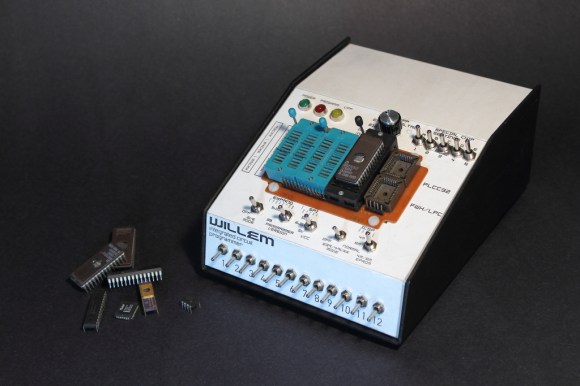[NeXT] needed an EPROM programmer to work with chips from vintage computers. Starting with a low cost programmer, he built this custom IC programmer to handle all of his programming needs.
The device is based on the Willem 5.0e programmer. [NeXT] was not satisfied with the device, noting that it had to be carefully isolated from metal surfaces during use and required setting many annoying jumpers.
To solve these problems, he started off by dismantling the programmer. The IC sockets were moved to a daughter board, which could be mounted cleanly into the metal enclosure. Replacing the jumpers was a bit more complicated, a combination of toggle and rotary switches were chosen to make changing settings easier.
Soldering the boards together looks like it was not an easy task, with 200 solder joints needed to connect the sockets and switches. After debugging some shorts and dead connections, [NeXT] managed to finish the 1.5 year project right before his Christmas deadline.
















Shiny!
Crazy amount of dedication considering a USB programmer that just works without any messing around for most things can be had on ebay for as little as $50.
That’s what he started with :)
I meant the ones without the crazy amount of jumpers that the willem has.
I concur. An entirely pointless project. A TL866CS from China doesn’t need any stupid jumpers and costs less than this “Willem” crap. Shoulda built a lab PSU instead, cause at least you can always use those.
If we didn’t make things just because you can buy them cheaper from eBay, this site wouldn’t exist and we wouldn’t make anything at all. Respect the workmanship, “making” is not a damn race.
Seriously.
As a viewer I appreciate the ‘constructive’ comments more than I do reading the (what i consider a pointless waste of space) ‘yeah great idea’, ‘+1″, style posts, which are unfortunately the majority. While it is nice to credit the original projects, its useless to read these posts.
What I got from this was an extremely preffereable outcome: I clicked expecting to learn more about universal eeprom, got a great write up and some awsome ideas for multiple projects, and a cheap ‘ready to go’ solution that could be purchased immediately.. Before this I was looking at purchashing a solution which required multiple units and shields, and I came out with a better product and a comparable price, and some inspiration for some other great projects and interfaces. That closure is damn cool!
>If we didn’t make things just because you can buy them cheaper from
>eBay, this site wouldn’t exist and we wouldn’t make anything at all.
You can’t buy everything from Ebay/China and there are lots of hacks you can do with stuff grabbed from Ebay. I’m not sure I get your point.
>Respect the workmanship, “making” is not a damn race.
I wrote “Crazy amount of dedication”.. that’s a mark of respect. If I was digging on this being a useless project I would have wrote “What a waste of time”. What is it with people around here being so touchy and trying to make this place into a collective circle jerk. If people put stuff on the internet surely they expect their peers to give feedback. Are people really expecting “Oh aren’t you a clever boy” and a pat on the back?
that was a LOT of soldering. a lot of effort, too.
nice job. nice photo work, as well.
Where do you even find project enclosures like this? Well done.
insane project :) but nicely done!
you should be able to find them from bud, lmb and the usual chassis companies. I see the sloping chassis like that at the local bay area store ‘halted’ (hsc). not cheap, but still being made.
Wow…. hsc is still around? I was so crushed when they closed the store near Sacramento that I just never looked into it.
Digikey is great but nothing beats surplus.
I’m surprised the Willem even works. Never had any luck with the damn things….
I had so much fun building this. Even if the project was extremely pointless due to jumperless USB solutions I got the chance to learn how to print custom overlays, machine enclosures (the enclosure itself I believe was a Hammond product) and perfect my soldering methods on a large scale. I learned a lot of helpful things along the way and it will probably help me on my next big project. (it’s a secret ;) )